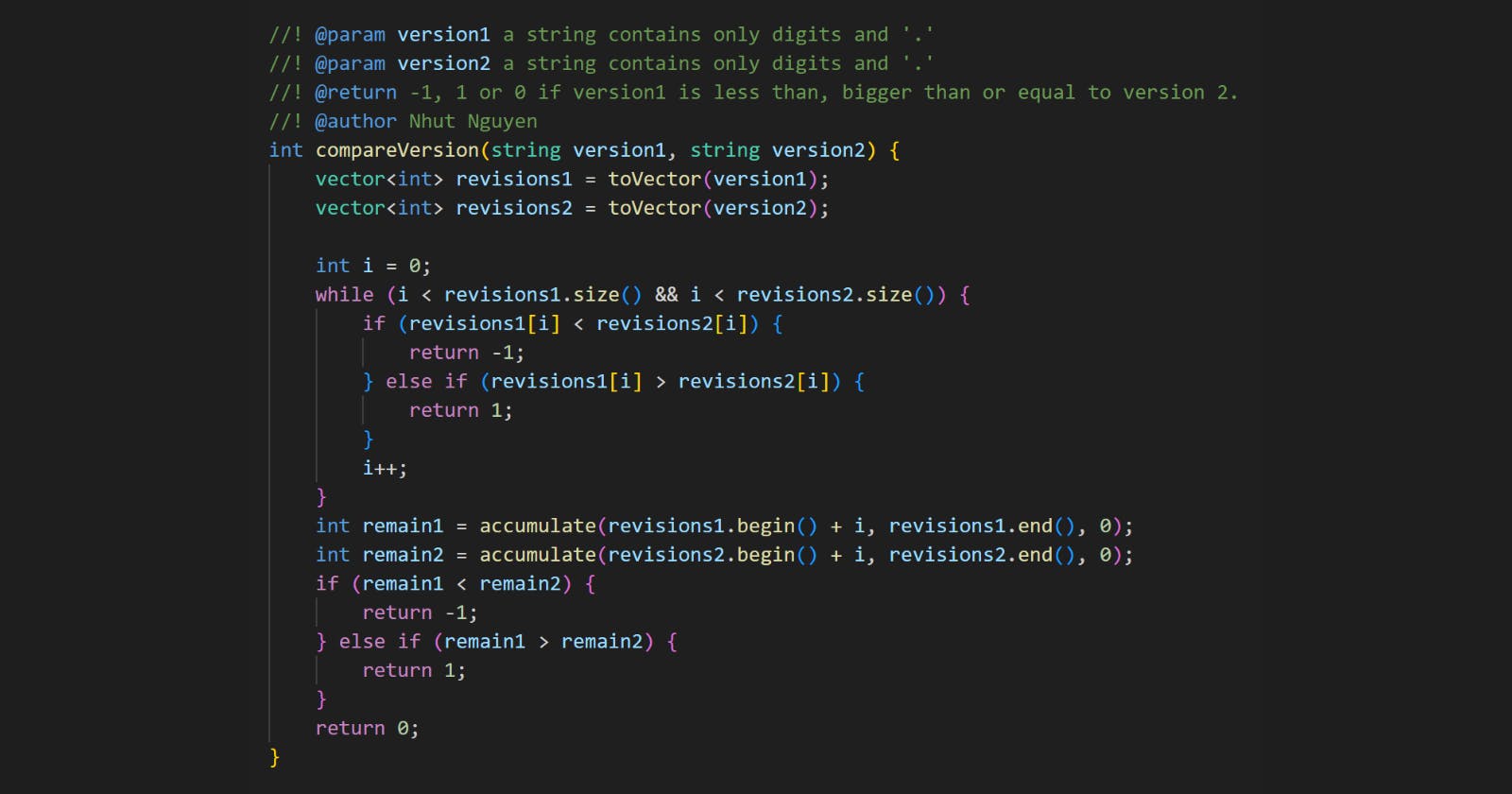Problem statement
Given two version numbers, version1 and version2, compare them.
Version numbers consist of one or more revisions joined by a dot '.'. Each revision consists of digits and may contain leading zeros. Every revision contains at least one character. Revisions are 0-indexed from left to right, with the leftmost revision being revision 0, the next revision being revision 1, and so on.
For example 2.5.33 and 0.1 are valid version numbers.
To compare version numbers, compare their revisions in left-to-right order. Revisions are compared using their integer value ignoring any leading zeros. This means that revisions 1 and 001 are considered equal. If a version number does not specify a revision at an index, then treat the revision as 0. For example, version 1.0 is less than version 1.1 because their revision 0s are the same, but their revision 1s are 0 and 1 respectively, and 0 < 1.
Return the following:
If
version1 < version2, return-1.If
version1 > version2, return1.Otherwise, return
0.
Example 1
Input: version1 = "1.01", version2 = "1.001"
Output: 0
Explanation: Ignoring leading zeroes, both "01" and "001" represent the same integer "1".
Example 2
Input: version1 = "1.0", version2 = "1.0.0"
Output: 0
Explanation: version1 does not specify revision 2, which means it is treated as "0".
Example 3
Input: version1 = "0.1", version2 = "1.1"
Output: -1
Explanation: version1's revision 0 is "0", while version2's revision 0 is "1". 0 < 1, so version1 < version2.
Constraints
1 <= version1.length, version2.length <= 500.version1andversion2only contain digits and'.'.version1andversion2are valid version numbers.All the given revisions in
version1andversion2can be stored in a 32-bit integer.
Solution
Each version can be considered as an array of revisions.
version = revisions[0].revisions[1].revisions[2]....
The problem is to compare each revisions[i] between two versions.
For example, revisions[0] of version1 is less than of version2 in Example 3. So the result is -1.
All revisions[i] of version1 and version2 are equal in Example 1. So the result is 0.
The number of revisions between the versions might not be equal (like in Example 2).
If all revisions of the shorter version are equal to the corresponding revisions of the longer one, the version having extra revisions and there exists a non-zero revision among them is the bigger one. Otherwise, the two versions are equal.
Code
#include <iostream>
#include <vector>
#include <string>
#include <numeric>
using namespace std;
vector<int> toVector(const string& version) {
vector<int> revisions;
string revision;
for (char c : version) {
if (c != '.') {
revision += c;
} else {
revisions.push_back(stoi(revision));
revision = "";
}
}
revisions.push_back(stoi(revision));
return revisions;
}
int compareVersion(string version1, string version2) {
vector<int> revisions1 = toVector(version1);
vector<int> revisions2 = toVector(version2);
int i = 0;
while (i < revisions1.size() && i < revisions2.size()) {
if (revisions1[i] < revisions2[i]) {
return -1;
} else if (revisions1[i] > revisions2[i]) {
return 1;
}
i++;
}
int remain1 = accumulate(revisions1.begin() + i, revisions1.end(), 0);
int remain2 = accumulate(revisions2.begin() + i, revisions2.end(), 0);
if (remain1 < remain2) {
return -1;
} else if (remain1 > remain2) {
return 1;
}
return 0;
}
int main() {
cout << compareVersion("1.01", "1.001") << endl;
cout << compareVersion("1.0", "1.0.0") << endl;
cout << compareVersion("0.1", "1.1") << endl;
}
Output:
0
0
-1
Complexity
Runtime:
O(N)whereN = max(version1.length, version2.length).Extra space:
O(N).
C++ Notes
std::stoi(string)is used to convert astringto anint. It ignores the leading zeros for you.std::accumulate(firstIter, lastIter, initValue)is used to compute the sum of a container.
Thanks for reading. Feel free to share your thought about my content.
What is your approach? The problem was picked from leetcode.com. You can submit your solution in any programming language and check the performance.

